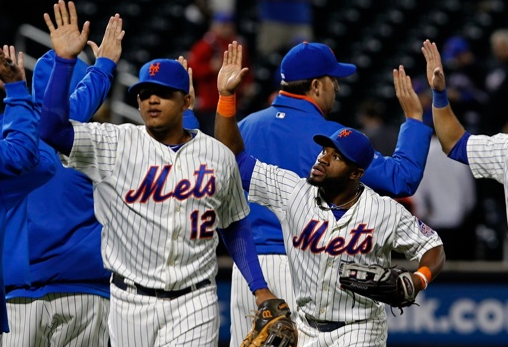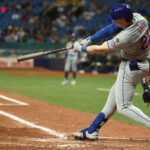
Eric Young Jr. fully understands that he needs to work on his on-base skills particularly if he’s going to reward manager Terry Collins who has placed all his faith on him as the team’s leadoff hitter this season. In a Q & A with Mike Vorkunov of the Star-Ledger, Young explains what he needs to do to help the Mets in 2014 and also talks about a variety of other things.
I know a lot of people have talked about your on-base percentage. Do you think that ability to add on extra bases after you’re on is kind of undervalued?
No. Ultimately you want to get on base. Obviously, I was able to do what I did last year with a lower on-base percentage. Just imagine once I get that higher. I don’t think you should ever get complacent in this game. Every year you want to improve something within your game. Obviously, on-base is going to be mine.
With Chris Young staring everyday and Eric as well, the duo have likely displaced Juan Lagares from a regular spot in the outfield and it’s still not clear if the defensive star will be relegated to the bench or demoted to Triple-A to begin the season.
Mike Puma of The Post wrote about that and says that Lagares’ reward for emerging among the best defensive center fielders in baseball last season is having to compete for a job with the Mets this spring.
I disagree with him and I do believe having a competition is perfectly fine when you’re talking about two players who had trouble getting on base at an acceptable rate. However, I think Collins is wrong for making declarations that one of them is his leadoff man, especially if it’s based solely on last year’s performance.
Lagares has also been working on getting on base and is coming off a great season in Winter Ball and was named the top Dominican rookie in January for his offensive and defensive talents.
According to Puma, one Mets pitcher expressed disappointment recently when told Lagares might not be the team’s starting center fielder in 2014. Another pitcher, Zack Wheeler, said it was reassuring to have Lagares in center. Last year, Lagares recorded 15 outfield assists to set a Mets rookie record.
“He’s also not scared to run full speed into the wall, and that definitely helps us mentally,” Wheeler said.
After Winter Ball, Lagares was also among the Mets players who attended an offseason conditioning and nutrition program in Michigan.
“The only thing I can show is what I know how to do: Play hard and try to do my job,” Lagares said.
What’s odd is that Terry Collins seemed to understand how Lagares helped the team despite his .240 average that included two months of sporadic playing time and a .180 start to his MLB career.
“The job we saw night in and night out, he was a tremendous defender with a great arm — he shut down the running game,” Collins said. “Teams just stopped trying to score some runs — unless there was two outs — they just stopped trying to score.”
Jared Diamond of the Wall Street Journal implies that Collins is too old-fashioned and that he doesn’t grasp many of the new concepts that younger managers use to construct their lineups and base their decisions on.
For example, Lagares makes solid contact and if just one of his line drives per week had found a gap instead of a glove, he would have finished the season with an average closer to .300 rather than .240. It really is a game of inches.
Despite Collins’s old-fashioned idea of the prototypical leadoff man, the Mets’ front office seems to grasp this, basing its offensive philosophy on pitch selection. But it’s Terry and not the front office who calls the shots on which players make the team when camp breaks.
Diamond says, that considering that Young doesn’t get on base enough and isn’t nearly as good a fielder as Lagares, it seems odd that Collins is bent on penciling Young into the leadoff slot. He explains that history indicates that, more likely than not, Young won’t show the kind of improvement he needs to be effective at getting on base and that he would need to rebuild his entire game completely.
Regarding Lagares’ rookie season, he contends that despite his poor showing at the plate, he made up for it on defense, ranking at the top of baseball among outfielders according to virtually every advanced metric. In the 88 games he started in center last season, Mets pitchers had a 3.55 ERA, versus 4.03 without him.
How the Mets’ outfield ultimately shakes out will be one of many things to keep an eye on this Spring. We all want the players who perform the best to be rewarded with the starting jobs. We all want the team to head north with their best 25 players. However, that has never been the case during Terry Collins’ first three spring trainings as Mets manager. Here’s hoping that things will be different in 2014 and that the best men win.














